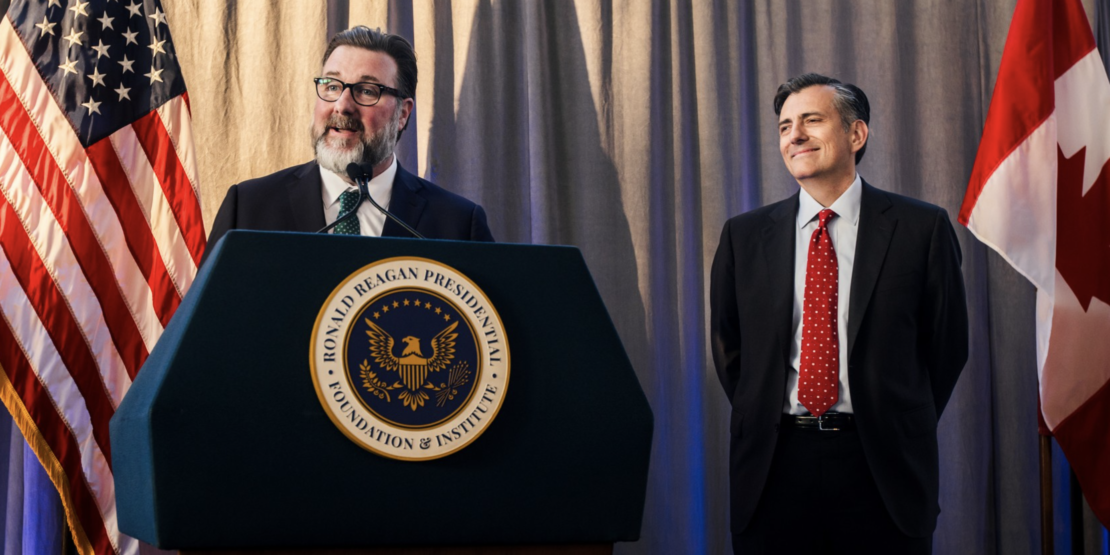There cannot be many settings more breathtaking than the site of the Ronald Reagan Presidential Library, situated in Simi Valley, California, about 40 miles north of Los Angeles.
Perched on the top of a majestic mountaintop, the library and museum (officially known as the Ronald Reagan Presidential Foundation and Institute) offers spectacular, sweeping views of the valleys below and the other nearby mountains, bathed on most days in warm sunshine and comfortable breezes from the nearby Pacific Ocean.
For two days in early June, the library and museum marked two days of major historical significance – June 5 (the 20th anniversary of President Reagan’s death) and June 6 (the 80th anniversary of the D-Day invasion in World War II, and the 40th anniversary of Reagan’s famous speech on the beach in Normandy, France) – with a two-day symposium that included such luminaries as former U.S. Secretary of State Condoleeza Rice, the daughter and son of former British Prime Minister Margaret Thatcher and Canadian Prime Minister Brian Mulroney, respectively, and numerous other former Reagan Administration officials, authors and historians.
And included amongst the panel discussions, fireside chats and speakers who played a major role in presidential history was a pretty prominent piece of some other history – that of William Woods University.
During the evening portion of the June 5 events, next to the Air Force One airplane that once ferried President Reagan around the nation and world, William Woods President Dr. Jeremy Moreland was invited on stage to officially donate a fascinating piece of the University’s past – two vinyl recordings of Reagan’s 1952 Commencement Address at William Woods – to the Reagan Library.
After more than seven decades, this rare artifact finally had a new home.
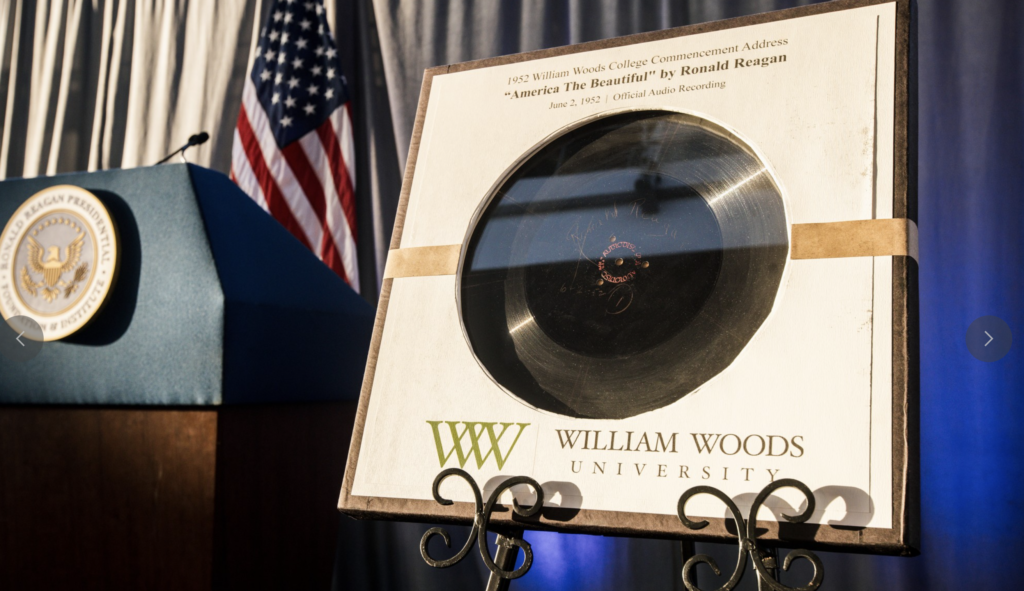
“William Woods shares a historic connection with one of the most consequential U.S. presidents of the 20th Century, when Ronald Reagan delivered the commencement address in 1952 at William Woods College, long before he entered the political arena,” Moreland told the gathering at the Reagan Library on June 5. “We are thrilled to officially donate the recording of this rare speech to the Reagan Foundation and Institute, so that future students, historians and curious U.S. citizens can have the opportunity to further debate and explore his legacy in American history.”
Echoing President Moreland’s words were David Trulio, President and CEO of the Reagan Foundation, who shared the stage with Moreland and accepted the donation.
“We are deeply honored that William Woods University would gift this rare 1952 commencement address recording to our archives here at the Reagan Library,” Trulio said. “We look forward to using this gift to help share it – including President Reagan’s messages of freedom, courage and opportunity – with the world.”
And with that, this unique piece of American and William Woods history had completed its journey, from storage on a small campus in mid-Missouri to its final resting place atop a stunning mountain-top library and museum setting – a “shining city on a hill,” to quote one of Reagan’s most famous phrases – in Southern California.
________________
In the Spring of 1952, America – and William Woods – was a different place. The nation was just seven years removed from victory in the defining historical event of our time, World War II. And William Woods was known as William Woods College, at that time an all-female two-year institution of approximately 400 students.
In need of a commencement speaker for the college’s June graduation exercises, Dr. Raymond McCallister Sr., then a member of the William Woods Board of Trustees, decided to reach out to an old college friend of his from his time at Eureka (Illinois) College to see if he was available. That friend was a 41-year old Hollywood actor by the name of Ronald Reagan, who was President of the Screen Actors Guild at the time, who readily accepted the invitation. Reagan ended up delivering his remarks on the warm, sun-splashed morning of June 2, 1952, in an outdoor ceremony just adjacent to Senior Lake.
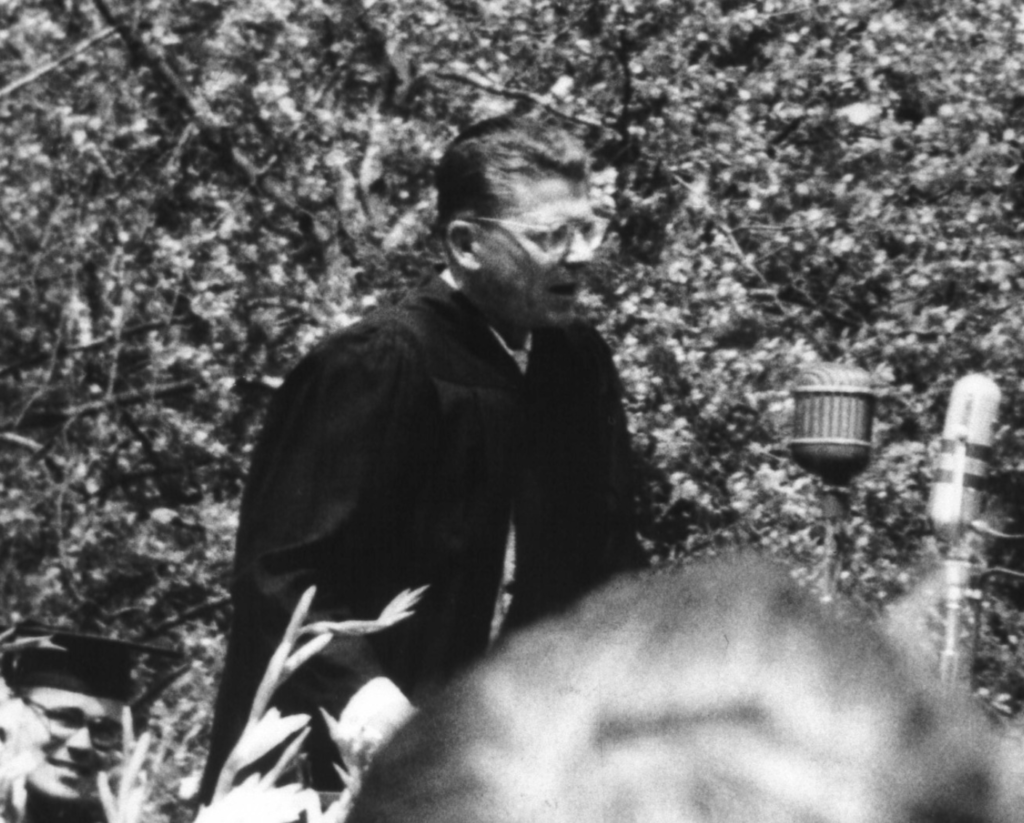
Pat O’Rourke ’52, of Fulton, remembers her graduation day like it was just yesterday. Assisting with the college’s public relations office, she actually was charged with typing the future president’s remarks for him. And then experiencing the day itself.
“It was a beautiful day, the sun was out, and there was a soft breeze blowing across the campus,” O’Rourke remembered. “All the chairs were out in front of the Academic Building, and they brought the organ out. It was beautiful.”
“Everybody got to shake (Reagan’s) hand and meet him, he was just so personable and all of us were just thrilled to death,” she continued. “It was a beautiful speech, everybody in America should hear it. It is the most patriotic speech you will ever hear.”
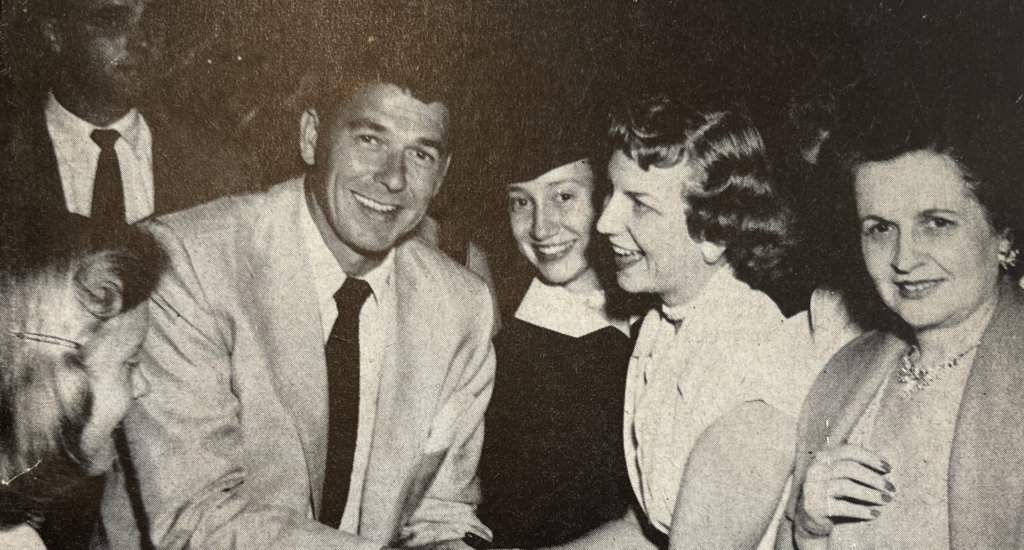
Not surprisingly, Reagan entitled his remarks “America The Beautiful,” and they offered a snapshot of a nation that had just emerged from World War II. The themes of his message – freedom, patriotism and the American can-do spirit – would serve as the basis for his political philosophy during his future time in public service, first as Governor of California and later as two-term U.S. President.
But as historical as Reagan’s words and appearance were to the small Midwestern college one Spring day in 1952, the story probably would have ended there, save for some fading black and white photographs and perhaps a write-up in a dusty old William Woods yearbook. Except that by chance, someone decided to record the speech on two vinyl records that day, a decision that would resonate a half-century later.
______________
During a period of campus renovations in the mid-1990’s, the decision was made to tear down several old buildings, including a Quonset hut that had once housed the William Woods campus radio station from the 1940’s through the 1960’s. But before it was demolished Erlene Krause, then Library Director at WWU, decided to take a look to see if there was anything of value inside.
“When I peeked inside of the Quonset, I discovered that it contained hundreds of old sound recordings,” said Krause, WWU Library Director from 1993-2022. “These included vinyl discs of popular music distributed to radio stations by the federal government during World War II, some 45 rpm discs of popular music, a few old glass discs, and some vinyl discs of in-campus events.”
Sensing that this collection might be of value, Krause requested that the collection be moved to the lower level of Dulany Library, as the other plan was to toss them into a dumpster. Another decade or so passed, when Krause received a fateful telephone call from a representative of a production company which was producing a film about Ronald Reagan. The company had learned about Reagan’s 1952 commencement address, had a transcript of it, and wanted to know if William Woods had a copy of it.
“I asked our technical services librarian Tom Schultz to look into whether or not recordings of the speech existed in the collection that was stored in the library basement, and a few days later he appeared at the door of my office with discs in his hand saying ‘I found it,’” Krause recalled. “The recording contained distortions from the sound of the wind, so Tom digitized it using computer software to reduce some of that, and then it was copied onto compact disc.”
The history had been discovered, and now others found out about it. Authors, historians and the occasional reporter called to inquire about the recording, but nothing came of it. Until another kind of history beckoned, in 2020.
_________________
With the 150th anniversary of the founding of William Woods in 2020, a series of events was planned to commemorate some of the most iconic moments in the University’s history. Finally, it seemed that the time had come for The Woods to remember Reagan’s moment at William Woods in 1952, and publicly acknowledge the moment. But the COVID-19 pandemic shelved the entire year-long commemoration, and the issue went back on the backburner.
Shortly after Dr. Jeremy Moreland became the University’s 13th president in 2021, he learned of the existence of the Reagan recording and set the wheels in motion to bring it back to life.
“Whatever your political leanings, few could argue that one of the most consequential presidents of the 20th Century was Ronald Reagan,” said President Moreland. “Having a future president articulate how he saw America and the world nearly three decades before he became president, in the form of a recording of a commencement address right here on our campus that has become a rare artifact, is a downright historical moment. It was incredibly worthy of our commemoration.”
Contact was made with the Ronald Reagan Presidential Foundation and Institute in California about a possible donation, but before that could happen, Reagan’s voice would need to heard one last time where it all began: on the William Woods campus.
On April 9, 2024, members of the University and local community gathered in Dulany Auditorium to hear the recording of the speech played for the first time ever in public. Taking place just a few hundred yards from where it was originally delivered in 1952, the evening included a retrospective from 1952 graduate Pat O’Rourke, a forum on Reagan’s legacy, Reagan and 1950’s memorabilia, and a keynote address by former U.S. Senator Jim Talent, Chair of the Ronald Reagan Presidential Foundation and Institute National Leadership Council.
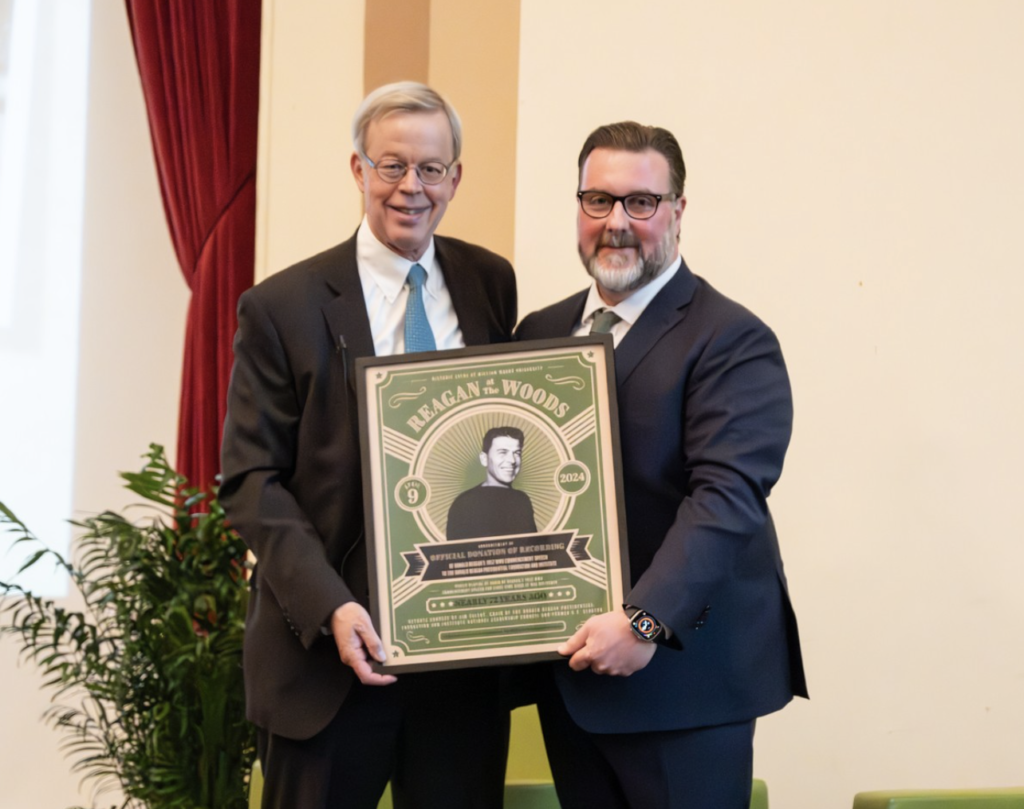
“It is a privilege for me to join the William Woods community in commemorating one of President Reagan’s early speeches,” said Talent during the April 9 event at Dulany Library. “It was a historic moment in the life of a great college, and now – because of the generosity of William Woods – the whole world will be able to share it.”
Which is what will now happen for eternity, as the Reagan 1952 commencement address at William Woods will live on in its new home at the Ronald Reagan Presidential Library. A moment in time, preserved for all for the foreseeable future.

